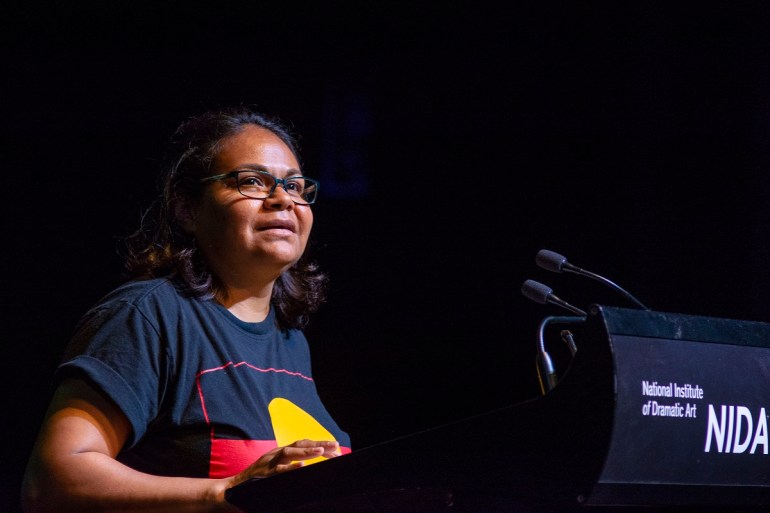Until there is diverse representation on stage and screen, not all Australians will feel acknowledged as a part of the society they live in, according Ursula Yovich.
The Burarra and Serbian actress, playwright, singer and songwriter delivered the inaugural NIDA NAIDOC Week Lecture yesterday, using her speech to call for cultural change that will lead to greater representation in the arts.
Yovich recounted that when she was young, she loved singing and religiously woke up at 6am each Saturday morning to watch ABC’s Rage.
And yet it wasn’t until she saw Whitney Houston for the first time that she ever imagined that a singing career was viable.
“I loved Tina Arena, John Farnham, Something for Kate, Crowded House, Wendy Matthews, INXS, Australian Crawl, Midnight Oil and Icehouse. But I never felt that I could actually become a singer, because that career path was not for people like me. Definitely not for a small-town Aboriginal girl.
“I was from the kind of people that the news depicted as criminals, alcoholics, down-and-out long-grassers that needed to be removed from the city because they were an eyesore.”
Houston was her “sliding doors” moment. Not only did she realise a such a career was possible, she was inspired to actively pursue one.
“She was someone that I could relate to because her dark skin matched mine. And she was in this position of power that I hadn’t seen my own mob or anyone of my colour in before. She was admired for her talent, her personality, her character. So that there was when I knew I was going to be a professional singer.”

For Yovich, Australian culture is one encompasses diverse groups of people from all over the world, and despite our different backgrounds, we still share many of the same values and customs.
Given this, she asked why diversity in the Australian arts sector remains an “uphill battle”.
She argued that as long as the Australian arts continues to reflect a “monochromatic” view of society, we will miss out on hearing so many of our stories. Only when everyone is included in what we tell will we understand the “rich tapestry” or finer details of who we are.
“Artists, they show us ourselves, they show us our history, and where we came from. Contemporary Australian culture is an array of colours, tones, languages, food, smells and textures. It is incredibly rich. We live in a diverse community. We live inclusivity every single day. It’s in our interactions on the streets, in restaurants, cafes, waiting rooms. We marry into diverse families,” she told the audience.
“Inclusivity shouldn’t be something we have to think hard about. We shouldn’t be thinking about quotas or ticking boxes because that’s seen to be doing the right thing. We should be thinking in stories and connections.”
There are some projects that Yovich argues have successfully reflected other sides to Australia, including three she starred in: Top End Wedding, Mystery Road and Gods of Wheat Street. Others include The Family Law. But she said there is still a long way to go.
Change, she hopes, will come through schools – places like NIDA – where students can be given safe spaces to tell their stories.
She left the audience of future storytellers with an order to reflect the current context in which they live and reside.
“Tap into that potential. The world is big. Create a platform for those worlds.”
Watch Yovich’s speech online.


